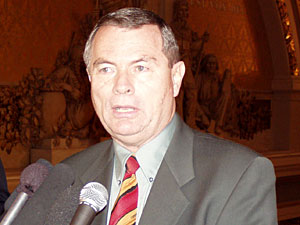Photos
Your Voice
| ||||||||||||||||||||||||||||||||||||||||||||||||
House bill sets up Senate battle over abortion, health programs
April 2, 2004
 |
| Rep. Fran Bradley says too many health care providers are spending too much time and money on treatments that aren't effective. (MPR Photo/Tom Scheck) |
St. Paul, Minn. — Rep. Fran Bradley, R-Rochester, says the bill tries to address rising health insurance premiums while maintaining the state's obligations to health and human service programs.
The bill would encourage greater competition by allowing for-profit HMOs to enter the state's marketplace. It also requires the state to create a set of treatment guidelines for health care providers to follow. Bradley says too many health care providers are spending too much time and money on treatments that aren't effective.
"I know that everyone of us know amongst all of our constituents up and down our main streets, the farmers and everybody, that the health care cost explosion is a huge problem. We are empowering consumers. We are empowering best practices," Bradley said.
The House bill doesn't implement Gov. Pawlenty's recommended payment cuts to pharmacies, hospitals and nursing homes. It relies on some spending cuts and a shift of money from the state's health care access fund to pay for programs.
The bill would also limit coverage requirements on HMOs. But the floor debate shows how difficult that may be, since an amendment requiring ovarian cancer screening for high-risk women was attached to the bill. That upset Rep. Denny McNamara, R-Hastings, who says HMOs will end up passing the costs of the requirements on to small businesses.
"Since 1996 our small landscape and nursery group health insurance costs have quadrupled and if we continue to add more mandates, we're going to add the straw that breaks our camel's back," he said.
Critics say the bill doesn't help Minnesotans with low incomes and is a giveaway to the insurance industry. Rep. Tom Rukavina, DFL-Virginia, says his constituents are concerned about both costs and quality. He says the bill only addresses cost.
"I've got a letter here from the Insurance Federation of Minnesota that you handed out that says they like your bill. Well of course they like their bill. It's an insurance company bill. It's like a fox writing me and telling me they like that I put him in charge of the chicken coop," Rukavina said.
The bill restores some cuts made during last year's session, primarily to programs for the elderly and disabled. Rep. Tom Huntley, DFL-Duluth, says cuts made to state subsidized health insurance for the poor should also be restored. He says Republicans are only restoring cuts that were politically unpopular, while disregarding those affecting people on low incomes.
"Last year we chopped the leg off of a lot of people. This year, this bill throws them a tourniquet and let's them stop the bleeding on the stump," he said.
Huntley and others say they also have concerns that the plan would cut cash assistance for welfare recipients who live in federal subsidized housing an additional 150 dollars a month. They also say it's unfair to cut health coverage for pregnant women who live in the state illegally.
That prompted Rep. Bill Kuisle, R-Rochester, to question if DFLers are more concerned about illegal immigrants or taxpayers.
"Let's give them health insurance and extend benefits as they come here. Even though they're not citizens. Let's give them all of the free health care they can afford and take it from the pockets of working Minnesotans. That's what the other side wants," he said.
The bill also includes a provision that would restrict the state's family planning money from going to any group that performs abortions or refers women to abortion providers.
Rep. Katie Sieben, DFL-Newport, says the provision could cause more unintended pregnancies.
"It would just be obvious that if we want to reduce the number of abortions we need to reduce the number of unintended pregancies and the best way to do that is to offer birth control options to women who don't have access to those," she said. Supporters of the provision say they don't want the state money going to abortion clinics like Planned Parenthood.
The bill will find resistance among Senate DFLers who are looking to restore cuts made last year and would cap annual health insurance premiums at six percent.
|
News Headlines
|
Related Subjects
|

